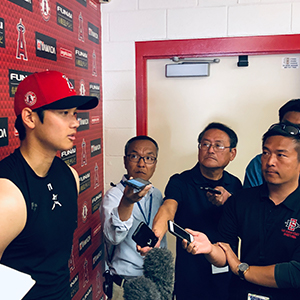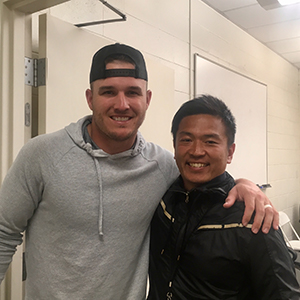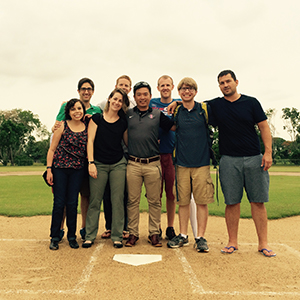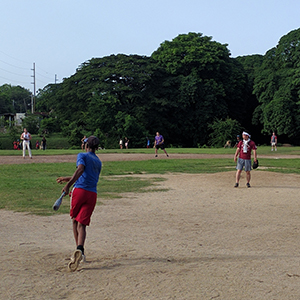Sports MBA Alumnus Covers Shohei Ohtani's Quest to Make MLB History
The Los Angeles Angels’ Shohei Ohtani was elected to this week’s MLB All-Star Game as both a pitcher and a batter, a first in the history of the Midsummer Classic. On this historic occasion for Ohtani, we caught up with a SDSU Sports MBA alumnus Nobu Saito (SMBA ‘17), a sports baseball journalist from Japan, who exclusively covers the record-setting Ohtani for Nikkan Sports News.

Nobu Saito (SMBA '17) , right, interviews Shohei Ohtani
SDSU Sports MBA: What is your current position?
Nobu Saito (SMBA ‘17): I’m a journalist covering MLB for Nikkan Sports News as a correspondent based in the U.S. I cover the Los Angeles Angels exclusively, specifically Shohei Ohtani, their standout two-way player from my native Japan. A link to my coverage of Ohtani for the paper (in Japanese, of course) is here.
SDSU Sports MBA: Where are you from in Japan and what is your background prior to the MBA program?
NS: I’m originally from Saitama, near Tokyo. Before pursuing my MBA from SDSU, I was a baseball writer for NPB (Nippon Professional Baseball) and an editor for Nikkan Sports News.
SDSU Sports MBA: Shohei Ohtani has emerged as a phenomenon unlike anything we’ve seen in Major League Baseball. What is it like having first-hand access to baseball history and covering this emerging superstar?
NS: Ohtani’s amazing performance as a two-way player has been incredible, and it seems like every time he plays he’s setting new records. Watching him play every night is incredibly exciting and makes me feel thankful to him for giving me the most priceless experience in my life. Personally, he’s affected me significantly with his positive attitude, which has taught me to remember to “never give up” to achieve what I want to do.
SDSU Sports MBA: When did you start covering Shohei Ohtani?
NS: I was first assigned to cover Shohei Ohtani in February 2018, when he arrived in the U.S. for his first MLB Spring Training.
SDSU Sports MBA: What has been the reaction to Ohtani in Japan?
NS: He is obviously a superstar for all Japanese people, and he’s getting a lot more attention than any other baseball player in Japan. People consume as much Ohtani content as possible- in news stories online, in newspapers, on TV, on YouTube, and on many different platforms. Ohtani’s success makes Japanese people happy and energized to move forward toward the future, despite the hardships currently going on throughout the world.
SDSU Sports MBA: What kind of support for Ohtani have you seen at home in Anaheim and on the road?
NS: Ohtani is now the Angels’ second-most popular player, following Mike Trout, based on how loudly fans are rooting for Ohtani at home in Anaheim. I’ve noticed that Ohtani also receives cheers from fans on the road, for example, in Boston, where they don’t typically root for opposing players. Fans on the road are always asking Ohtani to sign balls after a game and he often gives autographs to fans on the road. Ohtani metaphorically refers to the support of the fans as “the best form of doping,” meaning that the cheers from the fans energizes him when he’s both hitting and pitching.
SDSU Sports MBA: How do his Angels teammates feel about Ohtani and his presence on the roster and in the clubhouse?
NS: I’ve heard Angels players describe Ohtani as “competitive,” “regimented,” “always smiling,” “sarcastic,” and “humble.”
SDSU Sports MBA: Other than recapping on his impressive on-field achievements for Japanese fans, what is the goal of your reporting on Shohei Ohtani?
NS: Ohtani makes the impossible seem possible which, I think, encourages people to pursue their dream whatever their background or circumstance are. Many people, especially my colleagues in the media, were skeptical about what he was trying to do in attempting to both pitch and hit at the Major League level. It’s remarkable to see how Ohtani never gives up in his pursuit of achieving his goals and overcomes whatever challenges he faces. My goal in reporting on Ohtani and his inspiring story is to help people learn how to see him as an example of how they can achieve their potential, break through negativity, and maintain a positive mindset.
SDSU Sports MBA: How does the MBA education you received from SDSU Sports MBA help you in your current role?

Saito and Shohei Ohtani's Angels teammate, Mike Trout
NS: For reporters covering today’s MLB, both on-field and front office issues are critically important. As a Sports MBA graduate, I was able to easily understand how teams generate revenue from various sources, including different promotions, sponsorships, and advertisements. All of this sports business knowledge has contributed to my reporting.
SDSU Sports MBA: How has the Sports MBA alumni network added value to your career?
NS: As an alumnus of SDSU Sports MBA, specifically, the most valuable part of my connection to this program is the connection I have with the hundreds of alumni from SMBA in MLB and throughout the industry. The Sports MBA program broadened my horizons, strengthened my mind for business, and connected me with incredible people from around the world.
SDSU Sports MBA: Among the several Sports MBA alumni who work with the Angels, you’ve frequently crossed paths with Drew Zinser (SMBA ‘09), a Senior Account Executive at Angels Baseball. How have you interacted with Drew in the course of reporting on Ohtani?
NS: Drew has helped me understand and report on the impact Ohtani has had on the Angel Stadium of Anaheim in terms of the team’s corporate partnerships. Before Covid-19, we would frequently connect at Angels Stadium and go to an occasional happy hour with some of my former Sports MBA classmates, which helps maintain a strong connection between us SMBA alumni. In fact, I asked Drew to participate in this interview, so I’ve posed some Ohtani questions to him.
Nobu Saito (SMBA ‘17): Drew, from your perspective as an executive with the Angels, how has the presence of Shohei Ohtani affected the corporate partnerships department? Have you noticed more interest from Japan-based partners?
Drew Zinser (SMBA ‘09): The presence of Shohei has positively affected everything at Angels Baseball- from his play on the field, to an increase in ticket sales, and definitely more interest from Japanese companies to do corporate partnerships. Since Shohei has been with the team we have added at least 10 new Japanese partners through sponsorship. We have also seen a renewed interest in advertising this season since he has been getting so much positive press lately. The combination of the Angels brand in the marketplace and Ohtani’s skill and great attitude have attracted non- Japanese companies as well but the increase in Japanese-based partners can be directly attributed to him.
Nobu Saito: What is it about Ohtani that has attracted non-Japanese companies to sponsor him as well?
Drew Zinser: His skill at baseball is the first thing that attracts sponsors, but they also know he is such a nice guy and an extremely hard worker. This makes fans want to root for him which, in turn, makes sponsors want to be associated with him and the Angels. In fact, it’s been recently reported that sponsors who have personal endorsement deals with Ohtani have seen their stock prices outperform the marketplace. At the Angels, we have some crossover sponsors with Ohtani’s personal deals, with companies like ASICS and NISHIKAWA.
Nobu Saito: That’s incredibly interesting. I think beyond his performance, companies want to associate with Ohtani because of his amazing attitude. For example, I’ve always noticed that he gently hands off bats to the bat boys, and is very respectful on the field. It’s clear why he’s MLB’s highest earner in terms of personal endorsements. Thanks for the insight, Drew!
SDSU Sports MBA: Thanks to Drew for dropping in to answer some partnerships questions! We’ll now get back to interviewing you, Nobu. What were your favorite courses and who was your favorite professor in the Sports MBA program?
NS: I enjoyed both Statistical Analysis with Dr. Jim Lackritz and Business Strategy with Dr. John Francis. Dr. David DeBoskey was my adviser for my final culminating project report and gave me very valuable advice throughout that process, so he is my favorite professor.
SDSU Sports MBA: What was your favorite experience as a student in San Diego?

Saito and several Sports MBA classmates in the D.R.
NS: Working the 2016 All-Star Game at Petco Park as one of the program’s volunteer activities was my most memorable experience by far. My classmates and I were tasked with overseeing hundreds of youth baseball players from all over the U.S. in town to watch the Home Run Derby a day before the All-Star Game. I got to see Giancarlo Stanton win, which Ohtani has said was the most impressive Home Run Derby victory he’s seen.
SDSU Sports MBA: The Sports MBA program has an annual trip to the Dominican Republic, during which students are encouraged to customize the experience to their interests. How did you make your mark during your class trip to the D.R. in 2016?
NS: The trip to the Dominican Republic was a definite highlight of the program for me. The experience deepened my understanding of how vital baseball is to young men in the D.R., and how it can be tempting to rely too much on the game, leading to lack of education and further disparity of wealth. Our class was able to visit the D.R. headquarters of MLB in Santo Domingo and the Dominican Academies of several MLB teams including the Padres and Mets. I was able to arrange a visit to the Hiroshima Carp Dominican Academy, and it was a great experience to see an NPB team facility. I enjoyed collaborating with classmates from Mexico to help translate parts of the tour and Q & A with Carp executives from Japanese to English to Spanish.

Saito pitching to a Dominican ballplayer at a local field near the San Diego Padres Dominican Academy
SDSU Sports MBA: What are your favorite cities you have visited for Angels road games?
NS: My favorite cities to visit have been Boston, Toronto, and Minneapolis.
SDSU Sports MBA: What is the best meal you’ve had on the road?
NS: I’d have to say the crab cakes at a place called Angie’s Seafood in the Fells Point neighborhood of Baltimore, close to Camden Yards.
SDSU Sports MBA: Do you have any advice for any students in Japan considering the Sports MBA program as a way to break into sports business in the United States?
NS: I promise that the learning experience both inside and outside of the classroom will be priceless; it’s a once-in-a-lifetime opportunity. It’s very tough to acquire business knowledge in a second language, so hard work every day is necessary to finish this program. Do not hesitate to ask questions of professors and classmates and don’t be afraid to say “ I do not understand, please teach me.” In my experience, everyone will give you a hand and work together with you to understand the concepts. I also recommend actively participating in volunteer opportunities on days off from class, and spending time with classmates on the weekends, which will strengthen your friendships. This time with classmates will deepen your understanding of international cultures and help your classmates develop their understanding of Japanese culture.
SDSU Sports MBA: Thank you, Nobu, for your time. We are extremely proud of your success and wish you the best as you continue covering Shohei Ohtani during this historic, record-breaking season.
<Japanese>
エンゼルス大谷翔平選手が、オールターゲームに史上初めて投手と打者(DH)で選ばれました。この歴史的な快挙に合わせ、サンディエゴ州立大学のスポーツMBAプログラムの2017年の卒業生で現在、日刊スポーツのMLB担当、特に大谷選手を取材する斎藤庸裕氏にインタビューを行いました。
SDSU Sports MBA: 現在の職業は?
斎藤氏: 米国の特派員で日刊スポーツ新聞社のメジャーリーグ(MLB)担当をしています。主にエンゼルス大谷翔平選手を取材し、日々の記事を執筆しています。
SDSU Sports MBA: 出身地を教えてください。また、サンディエゴ州立大学スポーツMBA(SMBA)プログラムの前はどんな仕事をしていましたか?
斎藤氏: 埼玉県所沢市出身で、 以前は日刊スポーツの正社員として、紙面制作やプロ野球担当記者(ロッテ、巨人、楽天)を務めていました。その後、退職し、単身渡米でサンディエゴ州立大学のスポーツMBAを取得し、同社と再契約し、現在に至ります。
SDSU Sports MBA: 大谷翔平選手は最近のメジャーリーグで見たことがない非凡な存在として躍動しています。彼の近くで取材するという仕事はどんなものですか?
斎藤氏: 投打の二刀流として驚異的な活躍を見せれば歴史的な記録が生まれ、日々のプレーを見ている私に刺激を与え、心が踊るような感覚にしてくれます。人生でこのような価値ある経験ができることに本当に感謝していますし、個人的には、彼の姿勢が、何か成し遂げたいことについて決して諦めないということの大切さを教えてくれています。
SDSU Sports MBA: いつから大谷翔平選手の担当を務めていますか?
斎藤氏: 彼が初めてメジャーリーグの春キャンプに初めて参加した2018年の2月からです。
SDSU Sports MBA: 大谷翔平選手の日本での反響はどうですか?
斎藤氏: 日本人の野球選手の中でも最も注目を浴びているスーパースターで、インターネットや新聞、テレビ、YouTubeなど、多くの情報ソースで彼のニュースが流れています。今、世界で広がっているコロナ禍の困難の中で、彼の活躍が人々を幸せに明るく、将来へ向けて前向きにさせてくれているのではないかと思います。
SDSU Sports MBA: 大谷選手は本拠地や敵地のファンからどのようなサポートを受けているか
斎藤氏: 本拠地での声援の大きさから、今やMLBのスーパースター、トラウトに次ぐ、もしくは匹敵する人気の高さだと思います。敵地でも現地の日本人を中心に応援されていて、例えば5月のボストン遠征では試合後にサインを求めるファンに対応し、感謝の気持ちを示していました。また、ファンの声援について大谷選手は「一番のドーピングだと思う」と例え、打席やマウンドでの集中力を高め、パフォーマンスに好影響を与えてくれると言っています。それだけ、ファンは大谷選手にとって非常に大きな存在です。
SDSU Sports MBA: エンゼルスのチームメートは大谷選手をどのように人と表現していますか?
斎藤氏: よく聞かれるのは、負けず嫌いで規律正しく、よく笑い、時にサーカスティック(いたずらに皮肉っぽく)、そして謙虚な人間と言われています。
SDSU Sports MBA: 大谷翔平選手を取材することへのやりがいを教えてください
斎藤氏: 彼は、不可能と思われていたことを可能にしています。それは、どういう状況であろうと、人々が夢を実現するということに対して、前を向いていくエネルギーにもなると信じています。例えば、米メディアを中心に、エンゼルスに移籍当初はメジャーリーグで二刀流は難しいと思われていました。それでも彼は目標に向かい、チャレンジを続け、決して諦めません。こうしたストーリーを記事として伝えることで、人々が困難な状況でも前に進めるように、あらゆる可能性を広げられるように、少しでも手助けができればと思っています。
SDSU Sports MBA: サンディエゴ州立大学のMBAプログラムで学んだことが、今の仕事でどう生きていますか?
斎藤氏: 恥ずかしながら、以前はビジネスに関する知識が全くありませんでした。同大学での経験を経て、マーケティング戦略やイベントのプロモーション、メディア放映権や広告など、スポーツチームがいかに経営を成り立てているか、いかにして利益を生み出しているか、スポーツビジネスの世界をよく理解できるようになりました。
SDSU Sports MBA: サンディエゴ州立大学の卒業生とのコネクションが仕事のキャリアでどう生きていますか?
斎藤氏: 卒業生はMLBを始め、多くのスポーツチームやスポーツビジネスの仕事に関わっていて、様々な形で繋がることができています。米国だけでなく、様々な国のビジネスパーソンと繋がりを持てたことで、今までになかった可能性を広げてくれたと思っています。
SDSU Sports MBA: 09年の卒業生でドルー・ジンザー氏はエンゼルスでスポンサーシップ担当として働いていますが、彼との関わりについて教えてください。
斎藤氏: ドルー氏には大谷翔平が球団のスポンサーシップの仕事にどれだけの影響を与えているかなど、定期的に取材をしてきました。球場で会うこともよくありましたし、時には私の同期と一緒に飲食店に行ったり、良好な関係を築けています。実際に、ドルー氏に大谷選手に関する質問に回答して頂きました。
大谷選手の存在が、エンゼルスの球団スポンサーシップにどれほどの影響を与えているか、また日本企業からの関心は増えているか、教えてください。
ドルー氏: 翔平の存在は、日本企業からのスポンサーへの関心度を高めているのはもちろん、チケット販売などあらゆる面でエンゼルスの球団に好影響を与えています。実際に彼がエンゼルスに入団して以来、10企業がスポンサーとして加わりました。今季の素晴らしい活躍で、最近でも新しい企業が関心を寄せています。市場でのエンゼルスのブランドと、大谷の能力や素晴らしい姿勢の融合が、日本ベース以外の企業の興味も引いていますが、日本企業のスポンサー増は、彼が直接的な要因といっていいでしょう。
日本ベース以外の企業は、大谷選手どういうところを見ているのでしょうか。
ドルー氏: まずは彼の野球の能力が一番ですが、企業は大谷が非常にナイスガイで、練習熱心であることを知っています。多くのファンが彼を応援するようになり、だからこそ、スポンサー企業は彼とエンゼルスとつながりたい。実際に、大谷をスポンサーする企業は市場価値が上がっているとの記事も見られます。エンゼルスでは、ASICSやNISHIKAWAなどの企業が共同でスポンサーをしています。
確かに、試合でのパフォーマンス以外の面でも、大谷とつながりを持ちたいという企業はあるかもしれません。実際に、対戦したバッターの折れたバットをバットボーイに渡したり、フィールド上で非常にリスペクト精神が見られます。そういうことが、個人スポンサーで最も市場価値が高い存在となっているのでしょう。
SDSU Sports MBA: ドルーさん、ありがとうございます。インタビューに戻りますが、好きだった授業、教授を教えてください。
斎藤氏: ビジネス戦略(ジョン・フランシス教授)、統計学(ジム・ラクリッツ教授)ですね。また、デビッド・ディボスキー教授(会計学)は卒業論文の担当で、その都度、的確なアドバイスを頂き、最もお世話になった教授の1人です。
SDSU Sports MBA: サンディエゴで学生だった時の好きな思い出はありますか?
斎藤氏: 17年に同地で行われたオールスターのボランティアワークです。他州からやってきた野球少年達を球場に連れて行き、一緒にホームランダービーを観戦しました。その時の勝者が当時マーリンズに在籍していたジアンカルロ・スタントン。この時のホームランダービーは、エンゼルス大谷翔平投手も、印象に残っているシーンとして挙げています。
SDSU Sports MBA: ドミニカ共和国へのフィールドワークはどんな経験になりましたか?
斎藤氏: 大変貴重な経験で、メジャーリーグのチームだけでなく、広島カープの野球アカデミーにも訪問することが出来ました。実際に同国で生活をしたことで、いかに野球が必要不可欠なものか、またそこに依存し、教育や貧富の差が生まれていることの理解が深まりました。
SDSU Sports MBA: これまで訪れた米国の遠征先で好きな都市はどこですか
斎藤氏: ボストン、トロント(カナダ)、ミネアポリスです。
SDSU Sports MBA: 遠征先で食べた料理で最も好きな食べ物は
斎藤氏: ボルティモアのクラブケーキで、レストラン名は「アンジー・シーフード」です。
SDSU Sports MBA: サンディエゴ州立大学のスポーツMBAプログラムへの入学を検討している方にアドバイスはありますか?
斎藤氏: 第2言語として、ビジネスの修士号を取得することは非常に難しいことですが、分からない時、理解していない時は躊躇せずに、声を上げてください。必ず、クラスメートが助けてくれます。また、できる限り、オフの日にクラスメートが企画する集まりや、ボランティアに参加するようにしてください。彼らとのつながりを強め、また異文化をより一層理解できるきっかけになるはずです。間違いなく、一生に一度の、何にも代え難い経験になると思います。
SDSU Sports MBA: Nobuさん、有難うございました。歴史的なシーズンを送っている大谷翔平選手の取材を今後も続け、活躍されることをお祈りしています。

